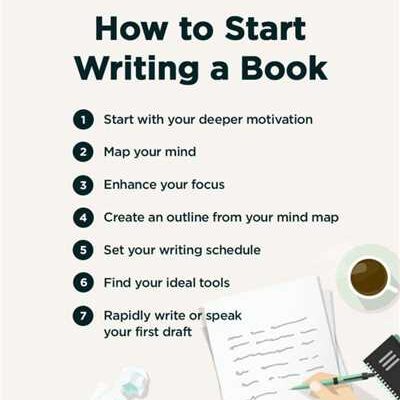
If you’ve ever dreamed of writing a book, now is the time to make your mark in the literary world. Composing a book is a journey that requires dedication, creativity, and a sprinkle of imagination. Whether you’re an accomplished writer or a novice, the process of putting words on paper and bringing your ideas to life is both exhilarating and challenging.
Before you dive headfirst into the writing process, it’s important to set yourself up for success. Start by outlining your book, creating timelines, and developing the plot and characters. This will help you stay focused and ensure a smooth flow of ideas. Remember, every book is different, and there’s no one-size-fits-all approach to writing. Some authors find it helpful to do extensive research, while others prefer to let their imagination take the lead.
Once you have a clear idea of what your book is about, it’s time to start writing. Set aside dedicated time each day or week to work on your book. This will help you stay motivated and ensure that you make progress. Don’t worry about getting everything perfect on your first draft – just get your ideas down on paper.
While it isn’t necessary to be a grammar expert, it is important to keep your writing clean and error-free. A quick online search can help you find tools and resources to assist with grammar and punctuation. If you feel like you need additional support, consider working with an editor who can help polish your work and ensure it’s ready for publication.
One of the most challenging steps in composing a book is finding the right balance between creativity and structure. As you write, pay attention to the pacing of your story and the development of your characters. Make sure each chapter has a purpose and moves the plot forward. By doing this, you’ll keep your readers engaged and eager to turn the next page.
Don’t be afraid to explore different genres and writing styles. The world of books is vast and diverse, and there’s something for everyone. If you’ve always been drawn to fantasy tales, give it a try. If you enjoy historical fiction, why not dive into that genre? The key is to write what you love and what excites you.
Once the first draft is done, take a step back and give yourself time to recharge. This break will allow you to approach the editing process with fresh eyes. Start by checking the overall structure and flow of your book. Make sure the plot makes sense and all loose ends are tied up. This is also a good time to check for any grammatical errors or inconsistencies.
After all the necessary revisions, it’s time to consider publishing options. There are traditional publishers who may offer a book deal, or you can explore self-publishing. With the rise of online platforms like Amazon Kindle Direct Publishing, it has become easier than ever to get your book out into the world without the need for a traditional publisher.
Remember, the journey of composing a book is filled with highs and lows. Some days, the words will flow effortlessly, while other days, you may hit a roadblock. Don’t let these roadblocks discourage you. Stay focused on your end goal and keep writing. With dedication, perseverance, and the right tools, you can turn your ideas into a book that will captivate readers. So go ahead, unleash your creativity and let your story be heard!
- 10 Steps to Writing a Book
- Motivation
- Step 2: Developing Your Book Idea
- Choose Your Genre
- Research Read Repeat
- Consider the Word Count
- How to start writing a book
- Find your writing space
- Your writing time
- Your Two Writing Tools
- Outline your story
- Writing your first draft
- What to do when you hit a roadblock
- Setting a Deadline
- Don’t be an editor
- Dictate your book
- The end is near
10 Steps to Writing a Book
Writing a book can be a daunting task, but with the right approach and mindset, it can become a reality. Here are 10 steps to help you get started on your literary journey:
- Choose your genre: Before you start writing, consider what genre you want your book to be in. This will help give you a clear direction and focus for your writing.
- Develop your idea: Once you’ve chosen a genre, it’s time to brainstorm ideas for your book. Take the time to think about what you want to write about and what themes or topics you want to explore.
- Create an outline: Before you dive into writing, it’s important to create an outline for your book. This will help you stay organized and give you a roadmap for the plot and structure of your story.
- Do your research: Depending on the topic or setting of your book, you may need to do some research. Make sure to gather any necessary information and facts to make your story more believable and authentic.
- Start writing: With your outline and research in hand, it’s time to start writing. Don’t worry too much about getting it perfect on the first draft – just get your ideas down on paper.
- Keep a writing schedule: To make progress on your book, it’s important to establish a regular writing schedule. Whether it’s a few hours a day or a couple of days a week, find a rhythm that works for you and stick to it.
- Find your writing space: Create a dedicated space where you can focus and write. This could be a quiet corner in your home, a cozy cafe, or a public library. The key is to find a space where you can immerse yourself in your writing.
- Seek feedback and revise: Once you’ve completed your first draft, seek feedback from trusted friends or writing groups. Take their comments and suggestions into consideration and revise your work accordingly.
- Repeat the editing process: After revising your book, go through several rounds of editing and proofreading. Check for grammar, punctuation, and spelling mistakes, as well as any inconsistencies or plot holes.
- Consider self-publishing or finding a publisher: Once your book is polished and ready, decide if you want to self-publish or look for a traditional publisher. Consider the pros and cons of each option and choose the one that best aligns with your goals.
Remember, writing a book takes time and effort. Don’t be discouraged if things don’t come together as quickly as you’d like. Keep working on your book, stay committed to your deadlines, and most importantly, enjoy the process of bringing your ideas to life!
Motivation
Motivation is one of the most important matters when it comes to writing a book. While there are technical steps to follow and an outline to develop, authors need to find their motivation to start and finish the writing process. Here are some steps to consider:
- Choose your genre: Before you start writing, consider what genre your book will fall into. Research different genres and find one that interests you the most.
- Develop your idea: Once you have chosen a genre, it’s time to develop your idea. Use your imagination to come up with a unique and compelling subject for your book.
- Outline your plot: Before diving into the writing process, create an outline for your book’s plot. This will help you stay organized and keep the flow of your narrative intact.
- Find your writing voice: Every writer has their own unique voice, which is what makes their writing stand out. Experiment with different writing styles and find the one that best suits your story.
- Set a deadline: Without a deadline, it’s easy to let your writing drag on forever. Set a realistic deadline for yourself to keep yourself motivated and on track.
- Break it down into sessions: Writing a book can be a daunting task, but breaking it down into smaller writing sessions can make it more manageable. Set aside dedicated time each week to work on your book.
- Don’t be afraid to make mistakes: The first draft of your book will not be perfect, and that’s okay. Don’t let the fear of making mistakes hold you back from getting your ideas down on paper.
- Seek feedback: Once you have a full draft, consider seeking feedback from beta readers or other writers. Their perspectives can help you identify areas for improvement.
- Revise and edit: After receiving feedback, revise and edit your book accordingly. Pay close attention to grammar, spelling, and sentence structure to ensure your writing is polished.
- Consider self-publishing: If traditional publishers are not showing interest in your book, consider self-publishing. There are many self-publishing options available that can help get your book out into the world.
Remember, writing a book is not an easy task, and there will be roadblocks along the way. However, by staying motivated, following these steps, and putting in the time and effort, you can overcome any difficulties and achieve your goal of becoming a published author.
Step 2: Developing Your Book Idea
Once you have created an outline and set your genre, it’s time to develop your book idea into a full-fledged concept. While it’s important to worry about setting deadlines and timelines, don’t get lost in the technicalities just yet. Focus on brainstorming and exploring different ideas in this phase.
One great course of action is to start with what you know. Look at the genres you enjoy reading or have heard about. Take some time to research popular topics within those genres and see if there’s something that piques your interest. Remember, it’s not always about reinventing the wheel. Many successful books come from familiar concepts with a unique twist.
While developing your book idea, don’t be afraid to write things down. Sometimes, a small idea can be the seed that leads to a great literary work. Keep a notepad or a document handy to jot down any thoughts or inspirations that come to mind. This way, you won’t lose them along the way.
To help you find ideas, there are plenty of online tools available to authors. Websites and applications like Hyperledger and working through online editor platforms can quickly help you explore different genres and subject matters. They can also assist in finding words that may count towards your overall word count, which is important as you get closer to publishing your work.
Another step in developing your book idea is to always keep grammar and structure in mind. While it may seem trivial at this stage, a well-written draft can make the difference between a potential roadblock and a seamless writing process. If grammar isn’t your strong suit, consider working with an editor to ensure your work is polished and ready for publication.
Remember, there’s no right or wrong way to develop your book idea. Each author has their own unique process, and what works for one person may not work for another. The key is to keep exploring and experimenting until you find the idea that resonates with you the most. Along the way, don’t be afraid to repeat some of the steps mentioned here – sometimes, revisiting an idea can lead you down a new and exciting path.
Choose Your Genre
When it comes to writing a book, one of the first decisions you need to make is which genre you want to write in. This choice will have a full impact on the direction and tone of your story, so it’s important to choose a genre that you feel comfortable with and that aligns with your interests and talents as an author.
Before you choose a genre, it’s a good idea to consider the different options available to you. There are many genres to choose from, each with its own unique characteristics and expectations. Whether you’re interested in romance, mystery, science fiction, fantasy, or literary fiction, there’s a genre out there that’s right for you.
One of the most important things to keep in mind when choosing a genre is that you shouldn’t feel limited by it. While it’s important to find a genre that fits the story you want to tell, don’t be afraid to push the boundaries and mix genres if that’s what feels right for your book.
When working on your book, it’s important to have access to resources and support that can help you navigate the genre you choose. There are many online communities, workshops, and writing classes that can provide guidance and inspiration throughout the writing process.
Of course, before you start writing, you should have a clear idea of the genre you want to write in. This will help you develop a strong plot, create well-defined characters, and ensure that your story aligns with the expectations of readers within that genre.
Another important thing to consider is your motivation for choosing a particular genre. Are you writing in a genre that you love and enjoy reading? Or are you writing in a genre that you think will sell well and make money? While it’s important to consider the market and what readers want, it’s equally important to write a book that you’re passionate about.
Once you’ve chosen your genre, it’s time to start making an outline of your story. This will help you keep track of the plot, characters, and important events that will happen throughout your book. It will also give you a blueprint to follow as you write, making the writing process smoother and more organized.
When you start writing, don’t worry too much about technical things like grammar and punctuation. The first draft is all about getting your ideas down on paper and letting your imagination and creativity flow. There will be plenty of time to revise and edit your work later.
Keep in mind that writing a book is a marathon, not a sprint. It may take time to find your voice and hit your stride as a writer. It’s important to stay focused and committed to your writing, even when the words aren’t flowing as easily as you’d like.
Throughout the writing process, it’s important to research your genre and familiarize yourself with the expectations and conventions of that genre. This will help you create a book that stands out and appeals to readers within that genre.
When your draft is written, don’t worry about sending it off to publishers or hiring an editor just yet. Take the time to step away from your work and give yourself some distance. This will allow you to come back to your book with fresh eyes and a new perspective, making it easier to spot any areas that need improvement.
Remember, the most important thing is to enjoy the process of writing and creating. Don’t be afraid to take risks and try new things with your book. Writing is a journey, and the end result should be a book that you’re proud of and that others will enjoy reading.
Research Read Repeat
When you begin the journey of composing a book, there are several important steps to take. One of the first and most crucial steps is research. Research is an easy way to hit the ground running and gather information on the topics you wish to write about. It allows you to find sources that will guide and support your ideas.
Once you have done your research and have a good understanding of your topic, it’s time to hit the books. Reading books similar to the one you want to write will give you an idea of what has already been written in your genre and how you can differentiate yourself from other authors. This step will also help you develop your own unique voice as a writer.
After reading and researching, it’s time to repeat the process. Writing a book is not an easy task, and it often takes multiple drafts and revisions to get it right. Once you’ve completed a first draft, it’s time to go back and read through it with a critical eye. Look for areas where the plot may need to be adjusted or where the flow of the narrative could be improved. This is also a good time to check for grammar and spelling mistakes.
While writing your book, you may encounter roadblocks or become stuck on certain scenes or chapters. Don’t let this discourage you. Instead, take a step back and think about the larger picture. Is there something you need to research further or a new idea you need to develop? Sometimes taking a break and coming back to your work with fresh eyes can lead to the best ideas.
When it comes to finding an editor, it’s important to consider what genres they specialize in. Different genres often have different rules and expectations, so having an editor who is familiar with your chosen genre can make all the difference in the final product.
Lastly, don’t forget to consider self-publishing as an option. Self-published books have become more widely accepted and there are plenty of resources available to help you along the way. Just be sure to do your research and find the best options for self-publishing in your genre.
Overall, composing a book is a journey that requires patience, dedication, and a lot of hard work. But with the right research, reading, and repetition, you can make your dream of becoming an author a reality.
Consider the Word Count
When you begin the process of writing a book, it’s important to consider the word count. This is the number of words that your book will contain, and it can have a big impact on how you approach the writing process.
Some authors find that they work best with a set word count goal in mind. For example, they may choose to write a book of around 80,000 words, which is a common length for many genres. Other authors prefer to let the story dictate the length, and they write until they feel that the story is complete.
When it comes to choosing a word count, there is no right or wrong answer. It ultimately depends on the genre, the subject matter, and what you feel is best for your story.
One thing to keep in mind is that books that are too short or too long may not appeal to publishers or readers. It’s important to find a balance and ensure that your story is told in the appropriate length.
Here are some tips to help you consider the word count for your book:
1. Research – Look at books in your genre and see how long they typically are. This can give you an idea of what readers in that genre expect.
2. Set goals – Make a timeline and set goals for how many words you want to write each day or week. This can help keep you on track and ensure that you’re making progress towards your deadline.
3. Consider your audience – Think about who will be reading your book and what their expectations might be. This can help guide you in determining the appropriate length.
4. Focus on the story – Don’t get too caught up in word count while you’re writing your first draft. The most important thing is to get the ideas down on paper. You can always go back and make edits later to add or subtract words if needed.
5. Edit and revise – After you’ve written your first draft, go back and review your work. Look for areas where you can tighten up the writing or expand on certain plot points. Editing and revising can help you fine-tune the word count to create a more cohesive and compelling story.
6. Don’t worry too much – While word count is an important consideration, it’s not the be-all and end-all of writing a book. Focus on telling a great story and engaging your readers. If you do that, the word count will naturally fall into place.
Remember, writing a book is a journey, and it’s important to enjoy the process. Don’t get too hung up on word count or other technical details. Just focus on bringing your ideas to life and creating a story that you’re proud of.
How to start writing a book
Starting to write a book can be a daunting task, but with the right mindset and approach, you can begin the journey of becoming an author. Here are some steps to get you started:
| Step 1 | Find your motivation |
| Step 2 | Choose a subject or topic |
| Step 3 | Do your research |
| Step 4 | Create an outline |
| Step 5 | Start writing your draft |
Before you start writing, it’s important to consider a few things. Firstly, know that writing a book takes time and effort. It’s not something that can be done overnight, so be prepared for a long-term commitment.
Next, think about what type of book you want to write. Are you interested in fiction or non-fiction? Do you have an idea for a novel or do you want to share your expertise in a specific field? Knowing what kind of book you want to write will help guide your research and writing process.
Once you have a clear idea of your book’s subject or topic, it’s time to start doing some research. This can involve reading books, articles, and online resources related to your chosen subject. The more you know about your topic, the better equipped you’ll be to write about it.
After conducting your research, it’s helpful to create an outline for your book. An outline provides a roadmap for your writing and helps you organize your thoughts and ideas. It can be as detailed or as simple as you’d like, but having a structure in place will make the writing process much smoother.
Now comes the challenging part – actually starting to write your book. Don’t get too caught up in technical details or trying to make every word perfect on the first draft. Just focus on getting your ideas down on paper. Remember, you can always come back and revise later.
One roadblock that many writers face is the fear of starting. They worry that their first attempt won’t be good enough or that they’ll get stuck and won’t be able to finish. Don’t let these fears dictate your writing. It’s important to push through and keep going, even when it’s difficult.
Become comfortable with the idea that your first draft will likely not be your best work. The most important thing is to get your ideas out there. Once you’ve completed a full draft, you can go back and make revisions and edits to improve the quality of your writing.
Remember, starting is often the hardest part, so don’t be too hard on yourself. Mark off regular writing time in your schedule and stick to it. Treat writing like any other work commitment and make it a priority. Even if it’s just for 30 minutes a day, set aside dedicated time for writing.
It’s always a good idea to find an editor or beta readers to review your work. They can provide valuable feedback and help you improve your book. Additionally, consider joining writing groups or connecting with other authors for support and advice.
As you work through the writing process, there are some tools and resources available to assist you. Many authors find it helpful to use word processing software like Microsoft Word or Google Docs to write and format their books. There are also online platforms and self-publishing services that can make your book available to a wider audience.
Lastly, when it comes to publishers, never count on making a lot of money or instantly becoming a best-selling author. While it’s certainly possible, the reality is that the majority of self-published books don’t achieve huge success. However, don’t let this discourage you. The joy of writing and the fulfillment of sharing your ideas with the world should be your primary motivation.
So, if you’ve always wanted to write a book, don’t wait for the perfect time or the perfect idea. Start today and take the first step towards making your dream a reality. Remember, the only way to finish a book is to start writing it!
Find your writing space

When it comes to writing a book, finding the right writing space can be crucial. Your writing space is where the magic happens, where your ideas come to life on the page. It’s important to have a space that is comfortable, inspiring, and free from distractions.
There’s no right or wrong answer when it comes to choosing your writing space. Some writers prefer a quiet room with a desk, while others thrive in a bustling coffee shop. The key is to find a space that allows you to focus and allows your imagination to flow.
If you’re not sure where to start, here are a few things to consider:
1. Find a quiet space: It’s important to find a space where you can concentrate and not be easily distracted. This could be a spare room in your house, a local library, or even a park bench.
2. Create a routine: Developing a writing routine can help you stay on track and make progress on your book. Set aside a specific time each day or week to work on your writing.
3. Remove distractions: Turn off your phone, close unnecessary tabs on your computer, and let others know that you are not to be disturbed during your writing time.
4. Set a deadline: Giving yourself a deadline can be a great way to stay motivated and ensure that you make progress on your book. Set a realistic date for when you want to have your book completed and use that as a guide to keep you on track.
5. Outline your book: Before you start writing, create an outline of your book. This will help you organize your thoughts and give you a roadmap to follow as you write.
6. Do your research: Depending on the genre of your book, you may need to do some research. Take the time to gather information and get a good understanding of the topics you will be writing about.
7. Let your imagination run wild: Writing a book allows you to explore your creativity and let your imagination flow. Don’t be afraid to think outside the box and come up with unique ideas for your story.
8. Write for yourself first: While it’s important to consider your potential audience, don’t let it dictate your writing too much. Write the story that you want to write and let your own voice shine through.
9. Keep a list of ideas: Inspiration can strike at any time, so it’s important to always be prepared. Keep a notebook or a document where you can jot down any ideas that come to you, so you can refer back to them when you’re ready to write.
10. Don’t worry about grammar and punctuation: When you’re in the writing phase, don’t worry too much about getting everything perfect. Focus on getting your ideas down on paper, and worry about the nitty-gritty details later.
Remember, the most important thing is to just start writing. There’s always going to be another roadblock or another reason not to start, but if you never begin, your book will never get written. So find your writing space, make sure it’s a place where you feel comfortable and inspired, and start making your ideas come to life.
Whether you choose to pursue traditional publishing or self-publishing online, the road to becoming a published author isn’t always easy. But with a lot of hard work, dedication, and a little bit of luck, anything is possible. So don’t let anything hold you back. Find your writing space, develop your ideas, and make your dream of writing a book a reality.
Your writing time
When it comes to composing a book, finding the time to write can be a challenge. Between work, family, and other commitments, it’s easy for writing to take a backseat. However, if you want to see your book become a reality, you need to set aside dedicated writing time.
First and foremost, establish a regular writing schedule. Whether it’s early mornings, late nights, or a specific block of time each day, stick to it. Treat your writing time as a priority, just like any other appointment or meeting. This will help you stay on track and ensure consistent progress.
Eliminate distractions during your designated writing time. Turn off notifications on your phone and computer, and find a quiet space where you can fully focus. If necessary, let your family or roommates know not to disturb you during your writing sessions. Eliminating distractions will help you make the most of your writing time.
Before you start writing, it can be helpful to have an outline or a rough plan for your book. This will give you a clear roadmap and make the writing process smoother. Take some time to brainstorm ideas and develop a structure for your book. Having a solid outline will save you from writer’s block and help you stay organized throughout the writing process.
While writing, don’t get too caught up in perfecting every sentence or worrying about grammar. Your first draft doesn’t have to be flawless. The goal is to get your ideas down on paper and let your imagination flow. You can always revise and edit later. Just keep the momentum going and focus on telling your story.
When it comes to writing a book, it’s important to choose a genre or subject that you’re passionate about. Writing about something you love will make the process more enjoyable and increase your chances of completing the book. Find a genre that excites you and dive into it with enthusiasm.
Research is a crucial part of the writing process. Dive into the world of your book through thorough research and familiarize yourself with the setting, time period, and any technical aspects related to your subject. Gathering information will add depth and authenticity to your writing, making it more engaging for readers.
If you find yourself stuck or hitting a roadblock, take a break. Sometimes stepping away from your work can clear your mind and provide a fresh perspective. Go for a walk, do something you enjoy, or simply relax. Giving yourself a mental break can often lead to new ideas and solutions to problems you may be facing in your writing.
For self-published authors, there are plenty of online resources and courses available that can help you develop your writing skills. Take advantage of these tools to refine your craft and learn new techniques. Additionally, consider joining writing groups or seeking feedback from beta readers or writing partners. Having others review your work can provide valuable insights and help you identify areas for improvement.
Remember, writing a book isn’t an easy task, but with dedication and a solid plan, it’s achievable. Set aside your writing time, eliminate distractions, and focus on bringing your ideas to life. Whether you’re writing a novel, a non-fiction book, or a technical manual, stay true to your vision and keep pushing forward. Your great work is waiting to happen!
Your Two Writing Tools

When it comes to composing a book, two essential writing tools are research and imagination. While these may seem like two opposite ends of the spectrum, they are both equally important in the writing process.
Research is the first step in developing your book. It’s necessary to have a solid understanding of the subject matter and gather information from various sources. Whether you’re writing a non-fiction book or creating a fictional world, having accurate facts and details will make your story more believable and engaging for readers.
On the other hand, imagination is the key to creating a captivating story. It allows you to make things up, come up with unique ideas, and build a world that readers can get lost in. Your imagination is your power to bring characters to life, build exciting plot twists, and create memorable settings.
| Research | Imagination |
| Research matters in writing because: | Imagination matters in writing because: |
| – It provides access to valuable information | – It allows you to develop unique ideas |
| – It helps with writing in a specific genre | – It helps to create engaging characters and settings |
| – It ensures accuracy and credibility | – It drives the plot and storyline |
While research and imagination may seem like two separate tools, they actually go hand in hand. They complement each other, and one tool is not more important than the other in a writer’s toolbox.
Of course, there are other tools that come into play during the writing process. Another crucial tool is an editor, who can provide guidance and feedback to ensure your writing is the best it can be. Additionally, having a timeline or outline can help you stay organized and ensure you hit key milestones along the way.
But when it comes down to it, research and imagination are the two fundamental tools that dictate the course of your writing. They are the tools that authors have relied upon for centuries to bring their stories to life. So, whether you’re writing a technical guide or a fantasy novel, never underestimate the power of these two tools.
Outline your story
When it comes to creating a book, whether it’s fiction or nonfiction, having a clear outline is essential. An outline is like a roadmap that helps you navigate through the writing process and organize your thoughts. It gives you the space to carefully plan out your story or subject matter, ensuring that everything flows smoothly.
Creating an outline for your book can be a daunting task, especially if you’re not sure where to begin. But don’t worry, there are plenty of tools and resources available to help you with this important step.
Start by considering what your book is about. Are you writing a fantasy novel or a self-help guide? Whatever the subject, be sure to have a clear idea of what you want to convey to your readers. This will help you outline the chapters and plan the flow of your story.
Don’t be afraid to break down your outline into smaller, more manageable parts. Each chapter can be a separate item in your outline, with subheadings to represent the main topics. This will make it easier for you to stay organized and focused as you write.
When outlining, it’s also important to think about the timeline of your story. Will it span a few days, months, or years? This will help you establish a clear chronology and ensure that events and plot developments occur in a logical order.
For nonfiction authors, outlining can be a bit more technical, as you may need to consider research and facts. It’s important to present information in a coherent and engaging manner, so a well-thought-out outline can be a valuable tool.
Remember, outlining is not set in stone. As you start writing, you may find that your narrative takes a different direction than originally planned. It’s okay to deviate from your outline if you find it’s best for the story. Flexibility is key.
Another potential roadblock when writing a book is finding the time to do it. Many aspiring authors struggle to balance their writing sessions with their day-to-day responsibilities. But don’t let this discourage you. Find a schedule that works for you, whether it’s a dedicated hour each day or a few uninterrupted writing sessions per week.
It’s always a good idea to mark deadlines for yourself, even if you’re self-published. Having a timeline will help you stay motivated and focused on completing your book.
Remember that all the great authors started somewhere, and writing a book can be a difficult endeavor. But with the right tools, determination, and a supportive writing community, you can become a published author.
When it comes to grammar and word choice, don’t get too hung up on the little things in the outlining stage. The most important thing is to get your ideas down on paper. You can always go back and refine your language later.
So, whether you’re a seasoned writer or a beginner, outlining your story is a crucial step in the book-writing process. Don’t be afraid to let your creativity flow and explore different ideas. With a solid outline, you’ll be well on your way to creating a compelling and well-structured book.
Writing your first draft
When it comes to composing a book, the first draft is often seen as a roadblock for many writers. But fear not! Here are some steps to help you overcome this hurdle and get your creative juices flowing.
1. Setting the stage: Before you head into the actual writing process, it’s important to check your mindset and the environment in which you’ll be working. Find a quiet space where you can focus and let your imagination run wild.
2. Take it step by step: Don’t worry about producing a perfect manuscript right from the start. It’s best to work with a loose outline or even just a general idea of the plot. This will give you some direction while still allowing your creativity to lead the way.
3. Dive in: Once you have an idea or a loose outline, start writing! The first draft is all about getting your thoughts down on paper, so don’t worry too much about technicalities or timelines. Just let the words flow and focus on getting the story out of your head and onto the page.
4. Embrace your voice: Every author has their own unique voice, so don’t be afraid to let yours shine through. Whether you’re writing in first person or third person, find the narrative style that best suits your story and stick with it.
5. Don’t get lost in the details: While it’s important to keep the overall story in mind, don’t get caught up in trying to make every sentence perfect. The first draft is all about getting the ideas out of your head and onto the page, so don’t worry too much about how it all fits together just yet.
6. Repeat, repeat, repeat: Writing a first draft is often a messy process, and that’s okay. It’s common for authors to go through multiple drafts before they feel satisfied with the final product. So don’t be disheartened if your first draft isn’t quite what you had imagined. Just keep writing and refining until you get it right.
7. Seek feedback: Once you have a full first draft, it’s always a good idea to get some outside input. Share your work with trusted friends, family, or even online writing communities to get constructive feedback. This feedback can help you identify areas that need improvement and make your story even stronger.
Remember, writing your first draft is just the beginning of your literary journey. Don’t be discouraged if it’s not perfect right away – no first draft ever is. The most important thing is to start and keep going. So grab your pen or fire up your computer, and let your imagination take you on a wild ride!
What to do when you hit a roadblock
When you’re in the midst of writing a book, it’s not uncommon to hit a roadblock. Whether it’s a difficult plot point, writer’s block, or simply feeling stuck, these obstacles can be frustrating. However, there are a few steps you can take to push through and find your way back to the writing flow.
1. Don’t panic: The first step when you hit a roadblock is to not panic. It’s important to keep a clear head and not let the frustration take over. Remember, hitting a roadblock is a normal part of the writing process and happens to most authors at some point.
2. Take a break: If you’re feeling stuck, it may be helpful to take a break from your writing. Step away from your desk, go for a walk, or engage in a different activity. Giving your mind a chance to rest and rejuvenate can often help to spark new ideas and get your creativity flowing again.
3. Do some research: If you’re facing a technical or factual difficulty, conducting some research can be incredibly helpful. Look up the information you need or consult reliable sources to ensure accuracy in your writing. This can also provide inspiration and new ideas for your story.
4. Reach out to an editor or writing partner: If you’re struggling with the structure or overall flow of your book, consider reaching out to an editor or a trusted writing partner. They can provide valuable feedback and help you work through any difficulties you may be facing.
5. Review your outline: If you have an outline for your book, go back to it and review what you’ve written so far. This can help you refocus and remind you of the direction your story is going in. If you don’t have an outline, consider creating one to help guide your writing process.
6. Break it down: Sometimes, a roadblock can feel overwhelming because we’re trying to tackle too much at once. Break down your writing into smaller, manageable chunks. Set goals for yourself, like writing a certain number of words or completing a specific section by a certain date. This can make the task feel more achievable and less overwhelming.
7. Seek inspiration: When you hit a roadblock, it’s often helpful to seek inspiration from other sources. Read books in similar genres, watch movies, or engage in activities that you enjoy. This can help you get in the right mindset and spark new ideas for your own writing.
8. Don’t worry about perfection: Remember that your first draft doesn’t have to be perfect. It’s okay to write without worrying about grammar or structure. Just focus on getting your ideas down on paper and worry about polishing them later. Embrace the messy process of drafting and allow yourself the freedom to make mistakes.
9. Start another project: If you’re feeling stuck on your current project, consider starting another writing project. This can help you take your mind off the roadblock and allow you to approach your original project with fresh eyes later on.
10. Keep going: Perhaps most importantly, don’t give up. Keep going, even when it feels difficult. Writing a book is a marathon, not a sprint, and sometimes the most challenging times are when the breakthroughs happen. Trust the process and keep pushing forward.
Remember, hitting a roadblock is a normal part of the writing process. Don’t be discouraged if you find yourself facing difficulties. With patience, perseverance, and a few strategies in place, you can overcome these obstacles and continue on your journey to completing your book.
Setting a Deadline
When it comes to writing a book, one of the most important steps is setting a deadline. Without a clear timeline, it is easy to get overwhelmed and lose motivation. By setting a deadline, you give yourself a specific goal to work towards and a timeframe to complete it within.
Before you start writing, it’s important to make a plan. Consider how many chapters you want to include in your book and how long each chapter will be. This will give you an idea of how many words you need to write in total and how much time it will take.
Having an online space to write can be helpful, as it provides easy access to your work from anywhere in the world. There are plenty of online platforms available where you can write and save your chapters.
Once you have developed a timeline, begin writing your book. Don’t worry too much about the technical aspects or grammar in the first draft. The most important thing is to get your ideas down on paper.
When writing a book, it’s common to encounter roadblocks along the way. If you find yourself stuck, try switching genres or developing a new plot. Sometimes a change in direction can reignite your motivation and help you get back on track.
As you write, consider the narrative flow and the voice you want to dictate. Each chapter should have its own unique tone and purpose within the overall story.
When you’ve finished your first draft, don’t worry about it being perfect. It’s normal for a book to go through several rounds of editing before it is ready to be published. Consider hiring an editor to help you with this process, as they can offer valuable feedback and suggestions.
Once your book is edited and polished, it’s time to start thinking about publishing. There are two main options: traditional publishers and self-publishing. Traditional publishers typically require a literary agent and can take years to get your book into the hands of readers. On the other hand, self-publishing gives you more control and the ability to publish your book faster.
Before you make a decision, consider your goals and what you want to achieve with your book. Both options have their pros and cons, so weigh them carefully.
Setting a deadline for yourself will help keep you on track and ensure that you make progress. It’s easy to get caught up in the world of your imagination, but a deadline helps you stay grounded and focused on completing your book.
Remember, the most important thing is to start. Don’t let the fear of not being good enough hold you back. Every author started somewhere, and the only way to become a better writer is to practice. So start writing, and don’t stop until you’ve reached the end!
Don’t be an editor
When you begin to write a book, it’s important not to get caught up in being your own editor. Too often, writers fall into the trap of constantly going back to edit what they’ve already written. This can hinder the flow of your work and make it difficult to ever get through a draft. Instead, focus on getting your ideas down on paper and worry about making it perfect later.
Here’s why you shouldn’t be an editor while you’re in the full flow of writing:
1. Access your inner writer
Writing is a creative process, and constantly editing can stifle your creativity. Give yourself the freedom to explore ideas and let your imagination run wild without the pressure of making everything perfect from the start.
2. Embrace imperfection
Remember that your first draft doesn’t have to be perfect. It’s just the beginning of your story, and there will be plenty of time to polish it up later. Don’t be afraid to make mistakes and write poorly structured sentences. The most important thing is to get your ideas on paper and let them flow naturally.
3. Develop your voice and narrative
When you’re constantly editing, you’re stopping the natural development of your storytelling voice. Letting your ideas flow without interruption allows you to find your unique style and tone. This is your chance to experiment with different narrative techniques and explore your storytelling abilities.
4. Break down roadblocks
Editing while writing can become a roadblock that stops you from progressing. By focusing solely on writing and not worrying about editing, you can easily break through any creative roadblocks that you come across. Just keep writing and trust that you’ll be able to refine and improve your work later on.
Remember, the first draft isn’t meant to be perfect. It’s just a starting point for your book. So don’t become an editor too soon. Let your ideas flow, embrace imperfections, and allow your storytelling voice to develop. You’ll be amazed at what you can accomplish when you give yourself the freedom to just write.
Dictate your book
Dictating your book is a great way to work on your writing without worrying about the technical aspects of grammar and spelling. There’s an online course available that can help you work on dictating your book, which is always a good option for authors who struggle with finding the motivation to sit down and write.
When dictating your book, there are three steps to consider: starting, dictating, and reviewing. Here’s how it works:
- Starting: Choose a subject or genre for your book. It could be anything from a fantasy novel to a technical guide. Make sure you have a clear idea of what you want to write about before you start dictating.
- Dictating: Find a quiet space where you can dictate your book without interruption. Use the dictation tools available on your device or computer to record your words. Let your thoughts flow and don’t worry too much about grammar or punctuation at this stage. Just focus on getting your ideas out.
- Reviewing: Once you’ve finished dictating, it’s time to review your words. Listen to your recorded dictation and transcribe it into written form. You can use an assistant or an online tool to help you with this process. Check for any errors or repetitions and make any necessary edits to improve the flow of your narrative.
After you’ve completed these steps, you’ll have a full draft of your book written and ready to be reviewed by an editor. Keep in mind that dictating your book is just one method of writing, and it may not work for everyone. Some authors may prefer the traditional method of sitting down and typing out their words. The important thing is to find the method that works best for you.
Dictating your book can be a liberating experience. It allows you to focus on the content and storytelling rather than getting caught up in the technicalities of writing. So if you’ve always wanted to write a book but have never found the time or motivation to sit down and do it, dictating may be the solution you’ve been looking for. Give it a try and see where it takes you!
The end is near
When it comes to finishing your book, the end can sometimes feel out of reach. But with the right strategies and a little perseverance, you can bring your writing journey to a successful close. Here are some steps to help you reach the end of your book:
- Set realistic goals and timelines: Before you begin writing, consider how much time you can dedicate to your book and what your desired completion timeline is. Setting realistic goals will keep you motivated and on track.
- Choose a genre: Decide on the genre of your book. This will help you narrow down your ideas and keep your writing focused. Some popular genres include mystery, romance, fantasy, and non-fiction.
- Outline your story: Create an outline for your book, breaking it down into chapters or sections. This will serve as a roadmap for your writing and help you stay organized and focused.
- Find your voice: Decide on the narrative style and tone you want to use in your book. Experiment with different writing styles until you find one that suits your story and voice.
- Write, write, write: Get down to work and start writing your book. Don’t worry about perfect grammar or getting every word right – the most important thing is to keep writing and getting your ideas on paper.
- Take breaks and rest: Writing a book can be a difficult and time-consuming process. Make sure to take breaks and take care of yourself. This will help you avoid burnout and keep your motivation high.
- Stay motivated: It’s easy to get lost in the world of your book and lose motivation along the way. Surround yourself with sources of inspiration, such as books in your chosen genre and writing sessions with fellow authors or writing groups.
- Revise and edit: Once you’ve finished your first draft, go through multiple rounds of revision and editing. This will help you refine your work and make it the best it can be.
- Consider self-publishing: If you’re having difficulty finding a traditional publisher or want more control over your book’s release, consider self-publishing.
- Check your work: Before publishing, make sure to have someone else, such as an editor or trusted friend, check your work for errors and inconsistencies. A fresh set of eyes can catch things you may have missed.
Remember, writing a book isn’t always an easy journey, but with commitment and the right mindset, you can see it through to the end. So don’t give up, keep going, and soon you’ll be able to proudly say that you’ve written a book.










